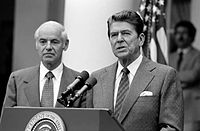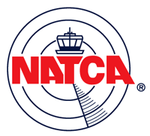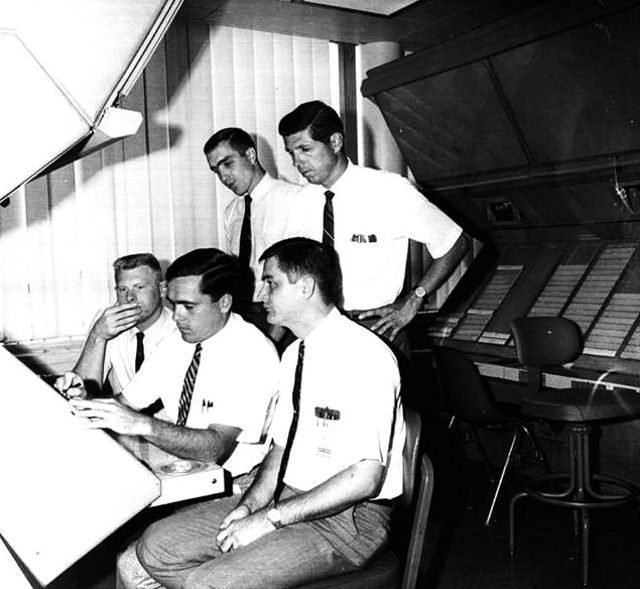Tomorrow, Aug. 3rd, is the 28th anniversary of the 1981 PATCO strike.

The air controller's union had issues around pay and hours, and more significantly there was a deeply held dissatisfaction at the way they were treated. PATCO was so disgruntled with President Jimmy Carter's administration that they were one of the few unions to endorse Republican Ronald Reagan. They met with the candidate, gave him $10K at a time when his campaign needed it, and Reagan sent the PATCO president a very nice thank you note--
Dear Mr. Poli:
I have been briefed by members of my staff as to the deplorable state of our nation's air traffic control system. They have told me that too few people working unreasonable hours with obsolete equipment has placed the nation's air travellers in unwarranted danger. In an area so clearly related to public safety the Carter administration has failed to act responsibly.
You can rest assured that if I am elected President, I will take whatever steps are necessary to provide our air traffic controllers with the most modern equipment available and to adjust staff levels and work days so that they are commensurate with achieving a maximum degree of public safety....
I pledge to you that my administration will work very closely with you to bring about a spirit of cooperation between the President and the air traffic controllers.
Sincerely,
Ronald Reagan
Oct. 20, 1980
Less than a year later, he fired most of them, explaining the antipathy with which many view the renaming of the downtown DC airport (DCA) from National Airport to Reagan Airport.
"THE STRIKE is a result of frustration that's been building up for years," PATCO striker Robert Devery told Business Week in 1981. "We're not on strike over money. Not 10 or 20 percent of these people would have walked out over money. People are tired of being dumped on, and they want to make it to retirement." 89 percent left before retirement age. About 40 percent of these left to collect disability retirement.
 Ronald Reagan was the first president to have been a lifetime member of the AFL-CIO, and he had been active in the Screen Actor's Guild. A young Assistant Attorney General named Rudy Giuliani (yes, him) came forward with a proposal: fire them all if they don't come back in. He explained that for the Administration, about to face negotiations with several much larger federal unions, it was win-win; Reagan won if they came back, and Reagan also won if he fired them and the system was restored relatively quickly. The image of a President who was willing to fight sat well with the foreign policy team. Reagan announced that any controllers who did not come back to work would be fired. (BTW, Rudy's repeated this trick.)
Ronald Reagan was the first president to have been a lifetime member of the AFL-CIO, and he had been active in the Screen Actor's Guild. A young Assistant Attorney General named Rudy Giuliani (yes, him) came forward with a proposal: fire them all if they don't come back in. He explained that for the Administration, about to face negotiations with several much larger federal unions, it was win-win; Reagan won if they came back, and Reagan also won if he fired them and the system was restored relatively quickly. The image of a President who was willing to fight sat well with the foreign policy team. Reagan announced that any controllers who did not come back to work would be fired. (BTW, Rudy's repeated this trick.) The controllers that had been on strike generally stayed out; 11,345 of the 13,000 strikers were fired. The airline system was hobbled over the short term. Military controllers reported to key airports and contingency plans were activated. A few weeks after the strike, 75% of scheduled flights were operating. Reagan won, PATCO lost, and American labor was never the same.
The controllers that had been on strike generally stayed out; 11,345 of the 13,000 strikers were fired. The airline system was hobbled over the short term. Military controllers reported to key airports and contingency plans were activated. A few weeks after the strike, 75% of scheduled flights were operating. Reagan won, PATCO lost, and American labor was never the same. The PATCO debacle was a tipping point in American labor relations, and contributed to a decline for the American middle class. There are a lot of different aspects that merit attention, but what I'd like to write about is: What happened with the new workforce, the Class of 1982 ?
How Did that Fresh Start End Up?
This was a clean slate, a tabula rasa, an opportunity to hire and develop a brand new workforce. In a way, it was like a start-up: fresh and new. Twenty-eight years later, where are those fresh-faced new hires now? In 1987 the new hires formed a new union, NATCA. The Clinton administration treated NATCA well and relations flourished. The Bush administration decided to set things straight and take it back; they broke the contract and imposed draconian new terms. The Obama administration is on the verge of mending fences, but the people are quite bitter. They've developed the same perspective as the controllers of 1981: they love their profession, but they hate their employer.
In 1987 the new hires formed a new union, NATCA. The Clinton administration treated NATCA well and relations flourished. The Bush administration decided to set things straight and take it back; they broke the contract and imposed draconian new terms. The Obama administration is on the verge of mending fences, but the people are quite bitter. They've developed the same perspective as the controllers of 1981: they love their profession, but they hate their employer.It's a remarkable coincidence. Probability would suggest that it wouldn't end up in the same place. And yet, it's like 1980 all over again. The pay may come back, but the trust will never come back.
How could this happen? They fired the controllers in 1981, but they didn't fire the paramilitary management culture.
The First Generation
The first big wave of controllers were military controllers after World War Two. There was another hiring wave of Korean veterans. They brought a military perspective and leadership style. In the 1960s society changed, but the FAA didn't. Para-military all the way. White shirts and black or brown ties; the IBM look, long after Big Blue had moved on.
FAA Administrators were admirals, generals, and airline executives - none of which are fields known for harmonious relationships. When 1981 happened, the military leadership style was reinforced. The union lost and management won.
The Second Generation: The Class of 1982
The fresh-faced new workforce of 1982 didn't have a shared military background. These were taxi drivers, lumber salesmen, pharmacists, pilots and teachers - very bright people who made it through a tough screening program and a tougher training program. The paramilitary culture that won in 1981 treated the new people like soldiers, too- except most of these people had never been soldiers. After a few years it got old. In 1987 they formed another union. Although things became humane during the Clinton administration, the entrenched management culture is paramilitary.The Next Generation
Carter and Reagan treated the post-1960's generation as soldiers, and they ended up firing them all. Bush treated the second generation (the Class of 82) as grunts, and that didn't work too well either. The question is: as the Class of 1982Related links:
Don Brown's GetTheFlick is (always) interesting.
So is Blue Eyed Buddhist.



4 comments:
I enjoyed this post and learning more about the past of ATC. My husband is a developmental so we have years to go with the FAA and i hope things finally take a turn and people are treated better
I was hired Aug. 23, 1981. I also enjoyed this post very much, very on point. Same problems, different decade. Backstabbers should be identified.
I never joined NATCA, maybe I was too military to see any other way to run things. Making ten times what I made as a Spec5 to get to actually control some real airplanes was just fine for me.
I'm glad to be done with it now, but it has taken me almost two years to quit thinking about ATC. Only this passing date made me look again.
My beef is not limited to the FAA. The Union showed it's true colors when they voted to take away over 7 years of seniority from me for teaching at the Academy. But the FAA gave the "seniority" thing away, and people like me got screwed. The members that got it could thank the "mob rule" that they supported. I've always hated democracies, both pretend and real.
One good thing that happened after this, the "recruiter" stopped coming around with his sign-up form.
i was 1 in 81 and we stood together for the cause unlike the guy above who was hired 8/23/81. who is he to talk about backstabbers !! he never joined natca , sure all he and many others like him cared about was their own ass and that he made 10 times what he made in the service. theres a brother for ya..must be nice to take his handoffs when the shit hits the fan...he couldnt get them off his frequency fast enough and put you down the pipe in the process.
working for Faa sucks because todays controllers as a group wont stand together over any issue. its all about me !! so there you go..
Great Story, Very True as the military mentality was and is still prevalent within much of FAA management! Rudy Guiliani has always been an anti-union Republican slime-ball and nothing will ever change, no matter how he tries to twist the facts of 1981. For "messianicdruid" above, your not joining NATCA and standing strong, yet bitching over losing seniority is a sham! You saved those "Union Dues" over all those years, yet took all the "Bennies" that others paid and worked hard to get! PATCO & NATCA have shaped the ATC profession since 1968 and without them, it would be turning the clock back to 1967! I don't think many would like to go back to those times.
Post a Comment
Comments and Feedback? Love that stuff. Please leave your thoughts in the box below--